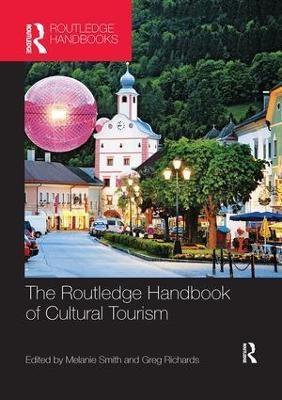
The Routledge Handbook of Cultural Tourism
Seiten
2017
Routledge (Verlag)
978-1-138-07142-1 (ISBN)
Routledge (Verlag)
978-1-138-07142-1 (ISBN)
The Routledge Handbook of Cultural Tourism explores and critically evaluates the debates and controversies in this field of Tourism. It brings together leading specialists from a range of disciplinary backgrounds and geographical regions, to provide state-of-the-art theoretical reflection and empirical research on this significant stream of tourism and its future direction.
The book is divided into 7 inter-related sections. Section 1 looks at the historical, philosophical and theoretical framework for cultural tourism. This section debates tourist autonomy role play, authenticity, imaginaries, cross-cultural issues and inter-disciplinarity Section 2 analyses the role that politics takes in cultural tourism. This section also looks at ways in which cultural tourism is used as a policy instrument for economic development. Section 3 focuses on social patterns and trends, such as the mobilities paradigm, performativity, reflexivity and traditional hospitality, as well as considering sensitive social issues such as dark tourism. Section 4 analyses community and development, exploring adaptive forms of cultural tourism, as well as more sustainble models for indigenous tourism development. Section 5 discusses Landscapes and Destinations, including the transformation of space into place, issues of authenticity in landscape, the transformation of urban and rural landscapes into tourism products and conservation versus development dilemmas. Section 6 refers to Regeneration and Planning, especially the creative turn in cultural tourism, which can be used to avoid problems of serial reproduction, standardisation and homogenisation. Section 7 deals with The Tourist and Visitor Experience, emphasising the desire of tourists to be more actively and interactively engaged in cultural tourism.
This significant volume offers the reader a comprehensive synthesis of this field, conveying the latest thinking and research. The text is international in focus, encouraging dialogue across disciplinary boundaries and areas of study and will be an invaluable resource for all those with an interest in Cultural Tourism.
This is essential reading for students, researchers and academics of Tourism as well as those of related studies in particular Cultural Studies, Leisure, Geography, Sociology, Politics and Economics.
The book is divided into 7 inter-related sections. Section 1 looks at the historical, philosophical and theoretical framework for cultural tourism. This section debates tourist autonomy role play, authenticity, imaginaries, cross-cultural issues and inter-disciplinarity Section 2 analyses the role that politics takes in cultural tourism. This section also looks at ways in which cultural tourism is used as a policy instrument for economic development. Section 3 focuses on social patterns and trends, such as the mobilities paradigm, performativity, reflexivity and traditional hospitality, as well as considering sensitive social issues such as dark tourism. Section 4 analyses community and development, exploring adaptive forms of cultural tourism, as well as more sustainble models for indigenous tourism development. Section 5 discusses Landscapes and Destinations, including the transformation of space into place, issues of authenticity in landscape, the transformation of urban and rural landscapes into tourism products and conservation versus development dilemmas. Section 6 refers to Regeneration and Planning, especially the creative turn in cultural tourism, which can be used to avoid problems of serial reproduction, standardisation and homogenisation. Section 7 deals with The Tourist and Visitor Experience, emphasising the desire of tourists to be more actively and interactively engaged in cultural tourism.
This significant volume offers the reader a comprehensive synthesis of this field, conveying the latest thinking and research. The text is international in focus, encouraging dialogue across disciplinary boundaries and areas of study and will be an invaluable resource for all those with an interest in Cultural Tourism.
This is essential reading for students, researchers and academics of Tourism as well as those of related studies in particular Cultural Studies, Leisure, Geography, Sociology, Politics and Economics.
Melanie Smith is an Associate Professor and Researcher in Tourism at the Budapest Business School in Hungary. Greg Richards is Professor in Leisure Studies at Tilburg University and Professor in Events at NHTV Breda University of Applied Sciences in the Netherlands
Introduction Section One: History Philosophy and Theory Section Two: Politics, Policy and Economics Section Three: Social Patterns and Trends Section Four: Community and Development Section Five: Landscapes and Destinations Section Six: Regeneration and Planning Section Seven: The Tourist and Visitor Experience Conclusions and Future Directions for Cultural Tourism Research
| Erscheinungsdatum | 30.06.2017 |
|---|---|
| Zusatzinfo | 16 Tables, black and white; 14 Line drawings, black and white; 21 Halftones, black and white |
| Verlagsort | London |
| Sprache | englisch |
| Maße | 174 x 246 mm |
| Gewicht | 748 g |
| Themenwelt | Kunst / Musik / Theater |
| Reisen ► Reiseführer | |
| Geisteswissenschaften ► Geschichte ► Hilfswissenschaften | |
| Sozialwissenschaften ► Soziologie ► Makrosoziologie | |
| Wirtschaft | |
| ISBN-10 | 1-138-07142-0 / 1138071420 |
| ISBN-13 | 978-1-138-07142-1 / 9781138071421 |
| Zustand | Neuware |
| Informationen gemäß Produktsicherheitsverordnung (GPSR) | |
| Haben Sie eine Frage zum Produkt? |
Mehr entdecken
aus dem Bereich
aus dem Bereich
innovative Wege der Konzeption und Evaluation von Ausstellungen
Buch | Softcover (2024)
transcript (Verlag)
CHF 49,90


